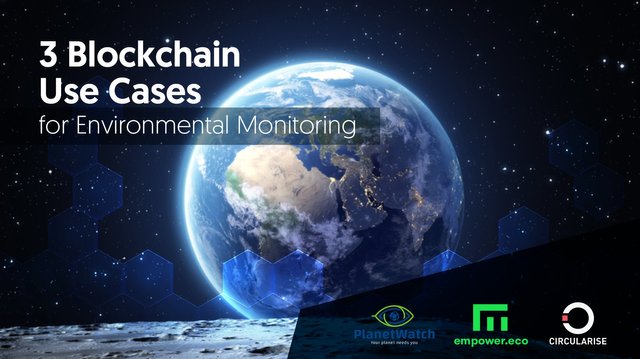Three Blockchain Use Cases for Environmental Monitoring
So far, blockchains have not been seen as a particularly environmentally friendly new technology. Everyone knows about the exorbitant energy consumption of Bitcoin that can easily match that of a small country. However, there is a ton of humanitarian blockchain projects out there with a growing number addressing environmental problems.
One essential part of environmental protection is the monitoring of pollution and the efforts to reduce pollution. The immutable and transparent nature of blockchain can excellently be used for this purpose. Here are three use cases of blockchain technology for environmental monitoring.
Air Pollution
Undoubtedly, greenhouse gas emissions and the resulting global warming is one of humanity’s biggest challenges. However, with all the media coverage surrounding climate change, it is all too easy to forget that CO2 is not the only pollutant that is causing health problems.
According to the world bank, air pollution has caused health problems with associated costs of almost five percent of the global GDP in 2016. Right now, pollution data is inadequate to address this problem.
This data is measured by a wide-meshed grid of sensors that are typically operated by governmental institutions that aggregate data and publish it on a daily basis. Thus, pollution data lacks both the temporal and spatial resolution to properly identify pollution sources.
PlanetWatch pattempts to increase the resolution by open-sourcing the process of setting up sensors and publishing data in real time on a blockchain. For this to work, users can either buy a sensor from PlanetWatch and operate it themselves, or sponsor a sensor that is operated by PlanetWatch. In exchange for recording data, users are rewarded with PLANET tokens.
For this ambitious venture, PlanetWatch has closed many partnerships: their software solution for acquiring and compiling data has been co-developed by CERN and their sensors have been developed in cooperation with the Italian National Research Council and the EU Joint Research Center. These low-cost sensors are capable of measuring fine particles, NO2, O3, CO, CO2, as well as temperature and relative humidity.
The measured data then sent and published on the Algorand blockchain. With 1000 TPS and a block time of only 5 seconds, PlanetWatch is able to generate a real time map of air pollution.
Plastic Waste
It is estimated that between 1.1 and 8.8 million tonnes of plastic waste is dumped into the ocean each year. This has devastating effects on larger marine animals like turtles and seals, but also seabirds. Some studies suggest that 90% of the seabirds in polluted areas contain plastic waste. Being passed through the food chain, microplastic and larger plastic degree, as well as their toxic chemical components are ultimately ingested by humans, affecting their health.
While it is very difficult to trace the sources of plastic waste in the ocean, the efforts of cleaning up the piles of plastic waste that are being washed up on the seashore require tracking and coordination. Empower is creating a circular economic system that helps in cleaning up plastic waste.
The users of empower can sponsor cleanup missions around the globe. People participating in such a mission collect plastic waste and deliver it to a collection point, where they are being rewarded in tokens based on the total weight of the plastic waste they deliver. In the same process, the waste collection efforts are being recorded on the blockchain.
Thus, Empower resembles the deposit system for plastic bottles common in many European countries, but on a global scale.
Recycling
Of course a better alternative than collecting waste is to reduce waste by the means of recycling. Many kinds of materials don’t need to be thrown away and can be recycled, such as glass, paper, metal, plastic, rubber, and electronics.
While this is an excellent way to reduce waste, there is not much profit to be made from recycling many materials. This is partly due to the fact the supply chain for recycling is often unclear on both sides of the process. In order to recycle a material, the waste the material is drawn from should be as pure as possible. For compound goods such as electronics, the recycling company needs to know the exact composition of materials.
On the other hand, manufacturers must be absolutely sure that recycled materials are suitable for their products. Thus, they must also be able to trace the supply chain history of the materials they are using. Circularise aims to facilitate the sharing of information, such as material composition, without having to disclose sensitive data, through the use of zero knowledge proofs.
With the help of Circularise, manufacturers and recycling companies can easily comprehend the full supply chain history of products and materials and, in result, material composition. This facilitates the recycling process and helps in reducing waste.
